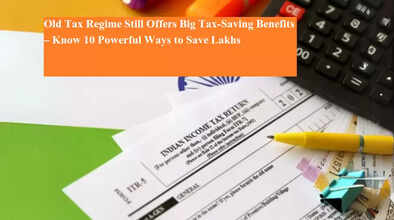Old Tax Regime Still Offers Big Tax-Saving Benefits – Know 10 Powerful Ways to Save Lakhs

Introduction: Why Old Tax Regime Still Makes Sense
While the Indian government has made the new tax regime the default and introduced tax exemptions up to ₹12 lakh income, many taxpayers still find the old tax regime more beneficial. Especially for those who invest in instruments like PPF, EPF, health insurance, home loans, or education loans, the old tax regime offers several tax-saving avenues. Under various sections of the Income Tax Act, taxpayers can claim deductions and save lakhs annually.
Here's a comprehensive breakdown of 10 tax-saving options under the old tax regime that can help you maximize your returns for the assessment year 2025–26.
1. Section 80C – Claim up to ₹1.5 Lakh in Deductions
This is one of the most popular sections for tax saving. You can claim deductions up to ₹1.5 lakh for investments and expenses like:
-
Life insurance premiums
-
ELSS mutual funds
-
Public Provident Fund (PPF)
-
Employees’ Provident Fund (EPF)
-
Sukanya Samriddhi Yojana
-
Home loan principal repayments
-
Children’s tuition fees
This section alone can significantly reduce your taxable income.
2. Section 80D – Deduction on Health Insurance Premiums
You can claim up to ₹25,000 for health insurance premiums paid for self, spouse, and children. Additionally:
-
₹50,000 can be claimed for senior citizen parents
-
If both taxpayer and parents are above 60, the limit goes up to ₹1 lakh
This is especially useful for families with elderly members.
3. Section 24(b) – Home Loan Interest Deduction
Taxpayers can claim up to ₹2 lakh on home loan interest under this section. This deduction is applicable for self-occupied properties and is over and above the principal deduction under Section 80C.
4. Section 80E – Deduction on Education Loan Interest
If you’ve taken a loan for higher education—for yourself, your spouse, children, or someone you’re the legal guardian of—then the entire interest amount paid is eligible for deduction. There is no upper limit for this deduction.
5. Section 80G – Donations to Approved Charities
If you donate to recognized trusts, religious institutions, or social welfare funds, you can claim 50% or 100% deduction depending on the organization. Ensure the institution is registered under Section 80G.
6. Section 80DD – Disabled Dependent Care
If you are caring for a dependent with at least 40% disability, you can claim ₹75,000. For 80% or more disability, the deduction increases to ₹1.25 lakh.
7. Section 80TTA / 80TTB – Interest on Savings and FD (For Seniors)
-
Non-senior citizens can claim up to ₹10,000 on savings account interest under 80TTA
-
Senior citizens can claim up to ₹50,000 including FD interest under 80TTB
8. Section 80CCD(1B) – Additional Deduction for NPS Contribution
On top of ₹1.5 lakh under 80C, you can claim an additional ₹50,000 deduction by investing in the National Pension System (NPS). This is a powerful tool for long-term savings and tax efficiency.
9. HRA and Other Allowances
If you live in rented accommodation, you can claim House Rent Allowance (HRA) deduction under Section 10(14). You can also avail tax benefits on:
-
Children’s education allowance
-
Leave Travel Allowance (LTA)
10. Section 80U – Deduction for Disabled Taxpayers
If the taxpayer is disabled:
-
₹75,000 can be claimed for 40% disability
-
₹1.25 lakh for 80% or more disability
This deduction is flat and doesn’t depend on the actual expenses incurred.
Conclusion: Old Tax Regime Still Saves Lakhs
While the new tax regime simplifies filing by eliminating most deductions, it may not be the best fit for everyone. If you have planned investments and specific expenses that fall under the above sections, the old tax regime can still offer massive tax savings. Choosing the right regime depends on your income structure and financial goals.
So before filing your Income Tax Return (ITR), do a quick comparison and calculate where you save the most—because a smart taxpayer doesn’t just earn more, they save smartly too

